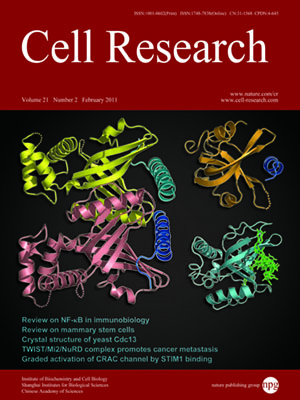
Volume 21, No 2, Feb 2011
ISSN: 1001-0602
EISSN: 1748-7838 2018
impact factor 17.848*
(Clarivate Analytics, 2019)
Volume 21 Issue 2, February 2011: 316-326
ORIGINAL ARTICLES
FOXA2 functions as a suppressor of tumor metastasis by inhibition of epithelial-to-mesenchymal transition in human lung cancers
Yunneng Tang, Guangwen Shu, Xinwang Yuan, Naihe Jing and Jianguo Song
Laboratory of Molecular Cell Biology, Institute of Biochemistry and Cell Biology, Shanghai Institutes for Biological Sciences, Chinese Academy of Sciences, Shanghai 200031, China
Correspondence: Jianguo Song,(jgsong@sibs.ac.cn)
The forkhead box transcription factor A2 (FOXA2) is an important regulator in animal development and body homeostasis. However, whether FOXA2 is involved in transforming growth factor β1 (TGF-β1)-mediated epithelial-to-mesenchymal transition (EMT) and tumor metastasis remains unknown. The present study showed that in human lung cancer cell lines, the abundance of FOXA2 positively correlates with epithelial phenotypes and negatively correlates with the mesenchymal phenotypes of cells, and TGF-β1 treatment decreased FOXA2 protein level. Consistently, knockdown of FOXA2 promoted EMT and invasion of lung cancer cells, whereas overexpression of FOXA2 reduced the invasion and suppressed TGF-β1-induced EMT. In addition, knockdown of FOXA2 induced slug expression, and ectopic expression of FOXA2 inhibited slug transcription. Furthermore, we identified that FOXA2 can bind to slug promoter through a conserved binding site, and that the DNA-binding region and transactivation region II of FOXA2 are required for repression of the slug promoter. These data demonstrate that FOXA2 functions as a suppressor of tumor metastasis by inhibition of EMT.
Cell Research (2011) 21: 316-326. doi:10.1038/cr.2010.126; published online 7 September 2010
FULL TEXT | PDF
Browse 2424


